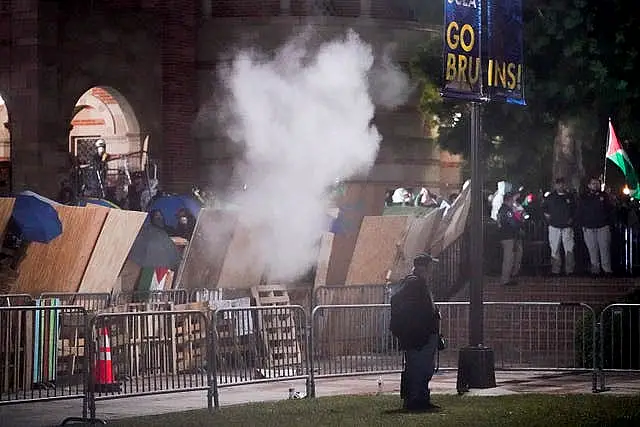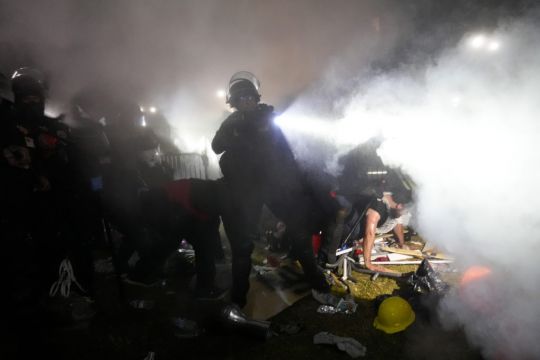Los Angeles police have begun removing barricades at a pro-Palestinian demonstrators’ encampment on the UCLA campus.
The move comes after officers spent hours on loudspeakers, threatening to make arrests if people did not disperse at the university in the Californian city.
Police detained a handful of people on campus, with their wrists bound in zip ties.
Hundreds of people had gathered on campus in support, both inside a barricaded tent encampment and outside of it.

The police action occurred a night after the UCLA administration and campus police waited hours to stop the counter-protesters’ attack.
The delay drew condemnation from Muslim students and California governor Gavin Newsom.
Demonstrators rebuilt the makeshift barriers around their tents on Wednesday afternoon while state and campus police watched.
On Thursday, as police helicopters hovered overhead, the sound of flash-bangs, which produce a bright light and a loud noise to disorient and stun people could be heard as police moved in, amid chants of: “Where were you last night?”
Police methodically ripped apart the encampment’s barricade of plywood, pallets, metal fences and trash dumpsters and made an opening toward dozens of tents of demonstrators. Police also began to pull down canopies and tents.

Demonstrators were holding umbrellas like shields as they faced off with dozens of officers. Some of the protesters warned their fellow demonstrators to be ready with water in case police release tear gas or other irritants.
The police action occurred a night after the UCLA administration and campus police waited hours to stop the counter-protesters’ attack. The delay drew condemnation from Muslim students and California governor Gavin Newsom.
Tent encampments of protesters calling on universities to stop doing business with Israel or companies they say support the war in Gaza have spread across campuses nationwide in a student movement unlike any other this century.

The ensuing police crackdowns echoed actions decades ago against a much larger protest movement over the Vietnam War.
In the Middle East, Iranian state television carried live images of the police action, as did Qatar’s pan-Arab Al Jazeera satellite network. Live images of Los Angeles also played across Israeli television networks as well.
The tense standoff at UCLA came one night after violence instigated by counter-protesters erupted in the same place.

The law enforcement presence and continued warnings stood in contrast to the scene that unfolded the night before, when counter-demonstrators attacked the pro-Palestinian encampment, throwing traffic cones, releasing pepper spray and tearing down barriers.
Fighting continued for several hours before police stepped in, though no arrests were made. At least 15 protesters suffered injuries, and the tepid response by authorities drew criticism from political leaders as well as Muslim students and advocacy groups.
By Wednesday afternoon, a small city sprang up inside the re-enforced encampment, now full of hundreds of people and tents on the campus quad. Some protesters said Muslim prayers as the sun set over the campus, while others chanted “we’re not leaving” or passed out goggles and surgical masks.
They wore helmets and headscarves, and discussed the best ways to handle pepper spray or tear gas as someone sang over a megaphone.
A few constructed homemade shields out of plywood in case they clashed with police forming skirmish lines elsewhere on the campus. “For rubber bullets, who wants a shield?” a protester called out.
The chaotic scenes at UCLA came after New York police burst into a building occupied by anti-war protesters at Columbia University on Tuesday, breaking up a demonstration that had paralysed the institution.
An Associated Press tally counted at least 38 times since April 18 where arrests were made at campus protests across the US. More than 1,600 people have been arrested at.







